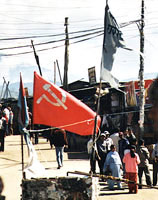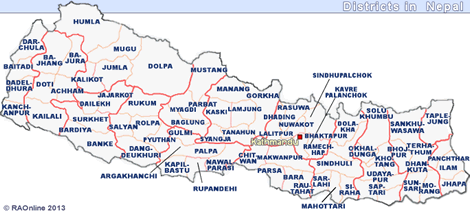Report:
Nepal's percentage increase in the annual defence expenditure
December
22, 2003
|
| The
percentage increase in the annual defence expenditure beginning 1985 through
1998 in Nepal remained at 4.7 percent as compared to 3 percent each in
India and Bangladesh and 2.3 percent in Pakistan. |
Stressing
that "war" has a long-term effects over economies, the report said increase
in security expenses (associated with security arrangements and preventive
initiatives for the reduction of the risk and consequences) is one of the
three worse consequences of war. The two other effects or "costs"
of war are human costs (in the form of death tolls, injuries and physical
damage) and industrial costs (loss of production, sales, goodwill and administrative
efficiency), a report said. In Nepal, the gross domestic product in the
last seven years decreased by 66 billion rupees only due to security expenses
and other war-related activities," an economist said, while passing comments
over the report.
It
is estimated that the Maoist insurgency has, so far, caused a loss of 18
billion rupees to Nepali economy. "But the actual cost may be much higher
than the estimates," said the Governor of Nepal's central bank, the Nepal
Rastra Bank.
Maoist
rebels want to change their strategy
October
22, 2003
|
| The
CPN-Maoist president and headman Prachanda announced the rebels would now
target US-backed organisations and halt attacks on government infrastructure.
He signalled a shift away from attacks on government buildings, telecommunications
and other infrastructural works. Prachanda said Nepalese police would be
given a chance to leave the force rather than be killed. Aid groups not
funded by the US would be allowed to work in villages after consultations
with the rebels, the rebel's most senior leader said. A new "tax" on businesses
would replace extortion. |
Nepal
cease-fire collapsed
August
27, 2003
|
| A
seven-month old cease-fire in Nepal between the government and Maoist rebels
has collapsed after the rebels declared there was no justification for
the truce amid an uncompromising stance from the Nepali Government. |
"We
have come to the conclusion that the cease-fire and peace process is unjustified
because of the government's attitude towards our demands," Maoist top leader
Pushpa Kamal Dahal, also known as Prachanda, said in a statement posted
on the Maoists' Web site. Prachanda however said that the rebels
would still keep the door for open for further dialogue on peace provided
the government showed flexibility. The cease-fire collapsed a week after
the third round of peace talks between the government and the Maoists.
The talks ended in a stalemate over the rebels' demand of elections to
a constituent assembly to draft a new constitution. The government rejected
the demand but said it was prepared to amend the present constitution without
changing the provisions for constitutional monarchy and parliamentary democracy.
Nepal
rebels soften on monarchy
March
15, 2003
|
| Nepal's
Maoist rebels have, for the first time, said they may not seek the end
of the country's monarchy. If the people accept the monarchy, there is
no problem, a Maoist negotiator said. |
Nepal's
Maoist rebels have, for the first time, said they may not seek the end
of the country's monarchy. If the people accept the monarchy, there is
no problem, a Maoist negotiator Throughout their seven-year insurgency,
the abolition of the monarchy has been on of the Maoist's principal aims.
But since the rebels and the army began a ceasefire in January, they have
not raised the issue. Now a senior rebel says it is up to the people of
Nepal to decide on the monarchy's future. However, a communist republic
still is Maoist's ultimate goal. Under the code of conduct, the two
sides agreed to cease from armed and provocative activities and also agreed
on fair access to the state-run media. The government also agreed to begin
the process of releasing Maoists prisoners. The rebels say they are committed
to peace. The date and the venue of the talks are still to be set. An expert
said there have been encouraging signs of progress towards a negotiated
settlement.
|







